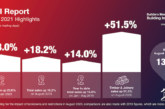The Covid-19 pandemic has led to a significant fall in activity in the construction market and in the wider economy. Consequently, the plumbers’ merchants’ market is forecast to decline by 18% in 2020, broadly in line with the forecast fall in construction output as a whole – according to the latest market insight from AMA Research.
There has been significant growth in online retailing, driven by competition from alternative suppliers and increased adoption of smartphones and tablets, leading to a shift in customers’ buying behaviour. Merchants have responded by increasingly offering transactional websites, with all of the national merchants and larger regional merchants now offering services such as click & collect. The shift to e-commerce and multi-channel offerings has helped ‘traditional’ merchants defend their market share against competition from internet-only distributors.
The internet is also increasingly being used for price comparison, with installers seeking the best deal possible. This is putting pressure on prices as well as creating a demand for greater price transparency, which is being reflected by some merchants with greater use of fixed pricing.
Michelle Turner, Editor at AMA Research, comments on the changing market “new faces are coming onto the scene, big players are making big decisions and the underdog is one to keep an eye on as smaller merchants claw back some market share in 2019. It is an interesting time for the Plumbers Merchants Market and as the Construction industry itself learns from COVID-19 and adapts to the new normal in its wake so too will the players within this evolving market. It is certainly one to watch as some major players lead the way into 2020.”
The next few years are likely to see further growth of ‘click & collect ‘and ‘click & deliver’ services and significant further investment in online and mobile transactional websites to enable merchants to remain competitive. Plumbers’ merchants that are able to offer multi and omni-channel services will prosper at the expense of those unwilling or unable to embrace the significant changes facing the market.









